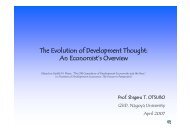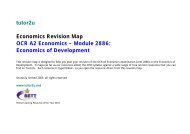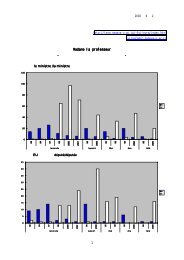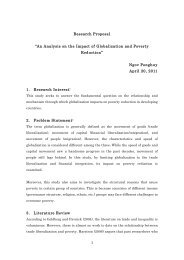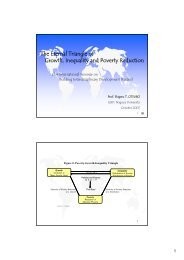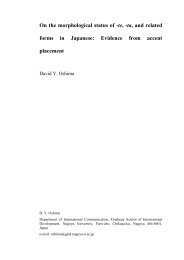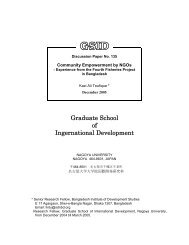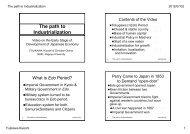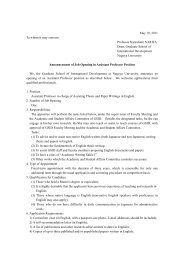Report
Report
Report
Create successful ePaper yourself
Turn your PDF publications into a flip-book with our unique Google optimized e-Paper software.
T RADE IN SERVICES AND SOUTH ASIA: AN OVERVIEW 99<br />
20–40% (Raihan and Mahmood 2004:6). Growth rates<br />
for trade in services fluctuated between 2000 and 2003.<br />
Between 1994 and 2003, services sector growth in<br />
Bangladesh exceeded overall GDP growth (Ibid: 5).<br />
Nevertheless, Bangladesh maintains one of the most<br />
liberal FDI regimes in South Asia, with no limits on<br />
foreign equity participation (Bangladesh’s TPR 2006).<br />
Possibly due to ‘a better enabling investment environment’<br />
and reduction of investment expenditure (cost),<br />
annual FDI inflows into Bangladesh grew almost ninefold<br />
during 2002–04, increasing from $52 million to<br />
$460 million and outflows were $3 million and $4<br />
million.<br />
Since the beginning of the 1990s, Bangladesh has<br />
adopted a number of policies to facilitate the expansion<br />
of the private sector and increase the inflow of foreign<br />
investment (UNCTAD-ICC 2000). The private sector<br />
is recognised as the engine of growth. Foreign companies<br />
are welcome. As already noted, the country offers<br />
perhaps the most liberal FDI regime in South Asia, with<br />
no prior approval requirements or limits on equity<br />
participation or restrictions on the repatriation of<br />
profits and income.<br />
UNCTAD-ICC also suggest that while discussing<br />
the investment climate in Bangladesh one of the weaknesses<br />
of the Bangladeshi economy is that it has low<br />
levels of skills and training in the workplace implying<br />
that foreign investors have an opportunity to invest in<br />
education and training (UNCTAD-ICC 2000). Similarly,<br />
it has been suggested that inadequate infrastructure<br />
provides immense investment particularly in the<br />
construction industry. This indicates that Bangladesh<br />
has strong import interest in both education and<br />
construction services and liberal commitments in these<br />
services would help the country meet the requirements<br />
of the economy.<br />
In Bangladesh, computer and related services,<br />
telecommunications, distribution services, life insurance<br />
and maritime transport services generally enjoy a<br />
positive balance of trade. Conversely, the following subsectors<br />
have shown a negative trade balance since 1999:<br />
rental and leasing services without operators;<br />
construction and related engineering services; education<br />
services; health-related and social services; tourism and<br />
travel-related services; news agency services; research<br />
and development services; and air transport services.<br />
Bangladesh’s import of tourism and travel-related<br />
services surpassed exports by $32.33 million. At $25.83<br />
million, the deficit in the education sector is also<br />
comparatively high. Overall, the level of trade in<br />
commercial services in Bangladesh remains low.<br />
In the context of the ongoing services negotiations<br />
at the WTO, Bangladesh has not yet submitted its initial<br />
offer and the Uruguay Round commitments it has<br />
undertaken are limited to tourism. In fact, during the<br />
Uruguay Round, Bangladesh had undertaken commitments<br />
in just one sub-sector covering five star hotels<br />
and lodging services under tourism sector. Later in<br />
1998, it also undertook commitment in telecommunications.<br />
However, as the paper argues, Bangladesh<br />
has strong import and to some extent exports interest<br />
in construction and education services and accordingly,<br />
it ought to undertake commitments in these services.<br />
Alongside, it needs to make wider and deeper commitments<br />
in tourism services as well.<br />
Nepal<br />
Nepal acceded to the WTO in 2004. As a result of the<br />
accession negotiations it has undertaken relatively<br />
liberal commitments in a number of service sectors.<br />
From GATS point of view, Nepal offers perhaps the<br />
most liberal services regime in South Asia. This assumes<br />
greater significance considering the fact that Nepal is<br />
an LDC. Nepal has undertaken commitments in all the<br />
services sectors being discussed here. Nepal however<br />
suffers from a variety of problems that commonly beset<br />
poor countries at an early stage of industrialisation<br />
(UNCTAD-ICC 2003). Skills and productivity in the<br />
workforce are at a low level. Infrastructure is insufficient<br />
and poorly maintained. There are also policy areas<br />
that need attention. One example is the labour law,<br />
which is widely seen in the business community as<br />
excessively restrictive.<br />
Services account for barely 39% of Nepal’s GDP<br />
which is only slightly higher than that of Bhutan’s GDP.<br />
The tourism and travel related service sector appears<br />
to be the area of its strength in services as the country<br />
has spectacular natural and cultural assets. Thus, while<br />
in tourism Nepal has strong export interest, in<br />
construction and education services it has import<br />
interests. Being a landlocked poor country any attempt<br />
to upgrade the state of its infrastructure will have<br />
economy-wide positive implications. Hence, attracting<br />
investment in the construction sector will be highly<br />
beneficial. Similarly, as the paper argues, in view of<br />
low skill level of the labour force, Nepal has to invest<br />
huge sums of capital to revamp its education commensurate<br />
to the requirements of its economy.<br />
In recent years Nepal has been moving towards<br />
creating a more hospitable environment for foreign<br />
investors (WIR 2004). In 1992, the government<br />
introduced a new policy on FDI and instituted a ‘one-




